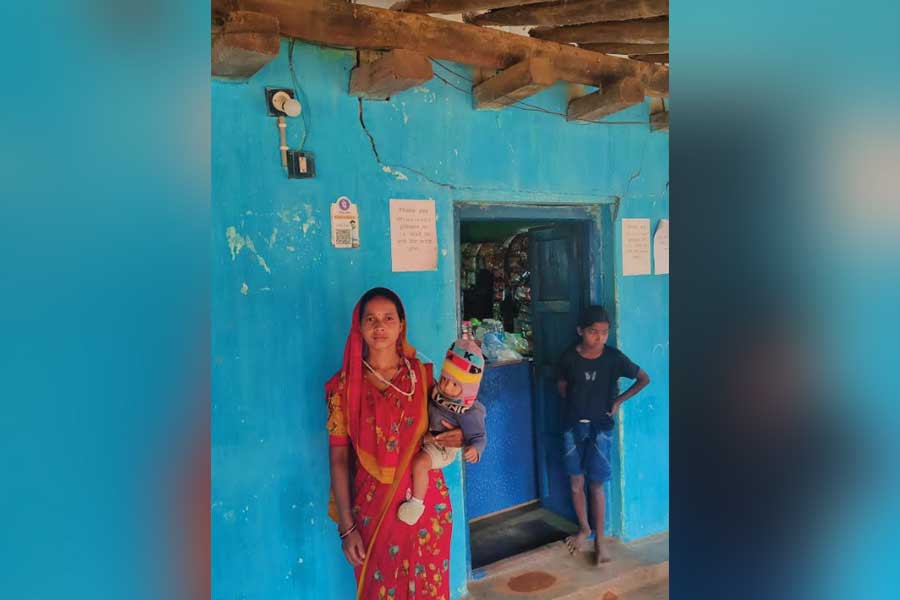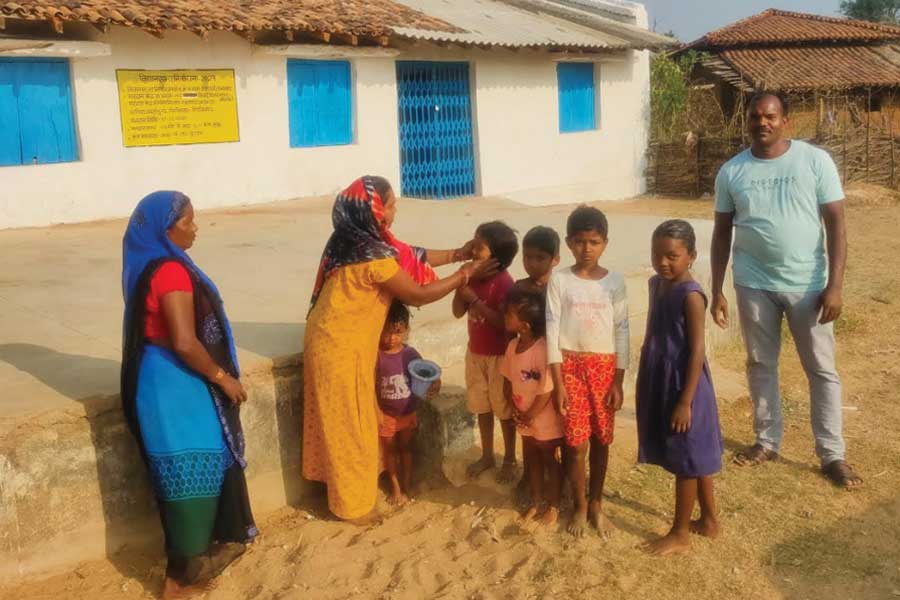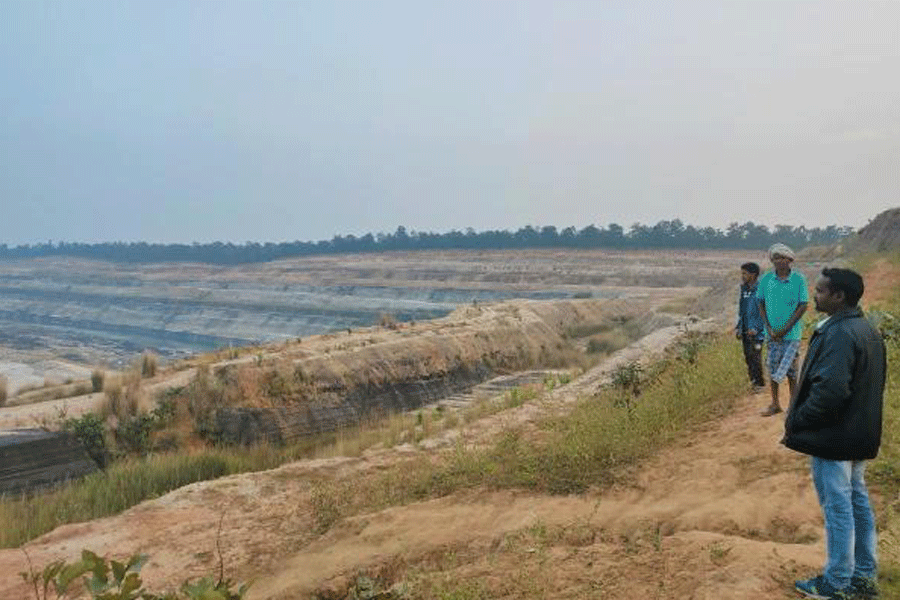Asked about their hopes from the Assembly elections, many voters in this contested forest have a counter question for The Telegraph.
It goes: “What do you think will happen after the polls?”
The question dogs common citizens, public representatives and activists alike. Their electoral participation is a gamble against the march of industrial might, and against drastic changes to their way of life, the air they breathe, and the forest they worship.
Hasdeo Arand or Hasdeo Aranya is a forest spanning more than 1,500sqkm in the catchment area of the Hasdeo, a tributary of the Mahanadi, in the districts of Korba, Surguja and Surajpur.
It covers the Assembly seats of Pali-Tanakhar, Ambikapur and Premnagar, all of them held by the Congress. The BJP and the Gondvana Gantantra Party (GGP) are the other main contenders in the November 17 polls.
The forest lies on an almost 1,900sqkm, eponymous coalfield with estimated deposits of almost 553 crore tonnes, a small part of which is being mined.
Protests had begun almost immediately after the previous BJP government in the state diverted more than 18sqkm of these woods in 2010 for mining by a Rajasthan PSU.
It’s now being mined for the PSU by the Adani group, which is under the glare of national Opposition parties for allegedly receiving undue favour from the Narendra Modi government to continue its work here, and for allegedly diverting coal to its own projects.

Usha Warkade standing under a crack on her wall that she attributes to blasting in the coal mines beside her home in Hariharpur village of Chhattisgarh's Surguja district on November 8, 2023. The Telegraph
The Congress has vacillated on the issue. The Manmohan Singh government overturned a previous categorisation against mining here and granted clearance in 2011.
Rahul Gandhi came and expressed solidarity with the protesters here in 2015. In the state, the issue is seen as a tussle between Congress chief minister Bhupesh Baghel and his deputy T.S. Singh Deo, the Ambikapur MLA.
The Baghel government initially supported the extension of the mines before accepting Singh Deo’s position against it.
Last year, the Assembly unanimously resolved against mining in Hasdeo Arand. For now, no new mines are being allotted. It’s a partial victory for the residents of 37 mostly tribal villages, with an estimated total population of at least 25,000, who have been protesting under the banner of the Hasdeo Aranya Bachao Sangharsh Samiti.
Samiti convener Umeshwer Singh Armo is sarpanch of Paturiadand, whose gram sabha successfully stalled mining within its area.
“The BJP is not talking about mining at all. The Congress hasn’t mentioned anything in its manifesto but its government told the Supreme Court (in July) that it doesn’t want mining in Hasdeo Aranya,” Armo told this newspaper.
“We can’t support anyone who doesn’t talk about the mining issue. We’re not fully with the Congress, either, because they must walk the talk. The land acquired in (neighbouring) Surguja district for the mines must be returned.”

(Left to right) Samakyabai, Heerabai and the children of Khotkhorri village in front of their polling booth, with Poundi Uproda Janpad Panchayat member Bajrang Singh Paikra in Chhattisgarh's Korba district on November 8, 2023. The Telegraph
Bajrang Singh Paikra, a Samiti organiser from the neighbouring Gidmudi village, is a member of the Poundi Uproda Janpad Panchayat and the GGP. Both villages fall under the Pali-Tanakhar seat, reserved for the Scheduled Tribes, in Korba district. Janpad panchayats are the second tier of the panchayati raj here.
Paikra is pushing for a poll boycott in one of the villages despite his own party being in the fray.
“I tried everything. I even led a delegation of 18 sarpanches to the education minister to demand a school in Khotkhorri. Of the 49 children here, only nine go to school — all outside the village, and stay with relatives,” he said.
“I thought that maybe the threat of a poll boycott by the people of Khotkhorri would help. But I have been threatened with arrest if there is any clash during the boycott.”
The school nearest to Khotkhorri — a village that moved uphill after being
submerged by the Hasdeo Bango dam in 1962 — is 8km away.
Heerabai, a mother of two in Khotkhorri, told this newspaper: “We are tired of telling the politicians. Maybe if you publish photos of my children in front of the polling booth (an irrigation department shed), they will turn it into a school.”
Paikra harvested three crops a year from his 10 hectares on the banks of a stream that flows into the Hasdeo.
“The water levels have fallen since mining began in 2011. Now I can harvest only a single crop from the part of the land that is away from the stream,” he said.
“When the BJP was in power, police harassed us a lot. That stopped when the Congress came. But how can I keep quiet if children from my block can’t study? If they don’t study, how will they understand the government and the laws and protect our land when they grow up?”
Armo and Paikra cited the example of Hariharpur, a village in Surguja’s Ambikapur seat that gave up land for the Parsa East Kete Basan coal block, to make their case against mining. The local GGP candidate, Balsai Korram, is from the village.
Usha Warkade of Hariharpur has three brothers-in-law working in the mines. Her earthen-wall home and grocery store have cracks that she attributes to the impact of blasting in the mine.
“My brothers-in-law make 15-16 thousand rupees a month, and wages are cut if they miss a single day. They got the jobs as part of the compensation for the land,” Warkade said.
“Two of them were recently transferred to Odisha but they haven’t gone yet. My main demand to politicians is to close the mines.”
The compensation of six to ten lakh rupees per acre was good in the context of the cost of living here. But for many of the families here, who are barely literate, the money did not last long.
“The men drank it all up, and bought motorcycles. There are so many accidents because of this,” Warkade said.
“They don’t just drink mahua (the traditional liquor brewed from the flower of the mahua tree) now, they drink anything they can buy and they fall ill.”
Rice, maize, millets and vegetables are grown here. Warkade and other villagers said their yield had fallen as the rains had been inadequate or unseasonal. “We manage now only because of the MSP (on rice and tendu leaves),” she added.
The Congress’s main poll plank has been the high procurement prices for these two commodities, which the BJP has tried to match in its manifesto. Tribal people here rue that the prices of other forest produce — like mahua and herbs — are dictated by the market, which often fails to compensate for the risks they take in collecting them.
“The elephants now attack us because they are agitated by the sound of blasting. Their watering holes have gone into the mines,” said Muneshwar Singh Porte of the Sangharsh Samiti, pointing towards the mines.
“Despite the low rates that the traders give us, the jungle is an ATM. We can go in and gather enough to exchange for new clothes or other things we like. Our gods are also in the forest. That ATM has now shut for us.”
He added: “Whoever wins the election, we have to continue the agitation to protect what is left because the companies will also keep trying to get the coal. And all parties want the money of the companies after they get our votes.”










